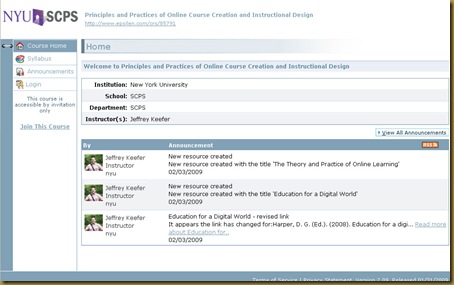One of the discussion lists I have recently started to follow, the one from the
Association of Internet Researchers, had an email posting that I found very useful, and just received the author’s permission (via email) to repost (as it was not available online outside of its original
archived posting). Thank you, Alecea Standlee (who is doing doctoral work at Syracuse University), for putting this together.
I am reposting this without making changes or alterations.
*****
Methods
Chen, Shing-Ling, G. Jon Hall, and Mark D. Johns. 2003. Online Social Research: Methods, Issues, & Ethics. Peter Lang Pub Inc.
Dicks, Bella, and Bruce Mason. 2008.
“Hypermedia Methods for Qualitative Research.” P. 740 in HandBook of Emergant Methods, edited by Sharlene Nagy Hesse-Biber and Patricia Leavy. The Guilford Press.Fielding, Nigel. 2008. The Sage Handbook of Online Research Methods. Sage Publications (CA).
Hewson, Claire. 2008. “Internet-Mediated Research as an Emergent Method and Its Potential Role in Facilitating Mixed Methods Research.” P. 740 in HandBook of Emergant Methods, edited by Sharlene Nagy Hesse-Biber and Patricia Leavy. The Guilford Press.
Kazmer, Michelle, and BO Xie. 2008. “Qualitative Interviewing In Internet Studies: Playing with the media, playing with the method .” Information, Communication & Society 11:257-278.
Kendall, Lori. 2002. Hanging Out in the Virtual Pub: Masculinities and Relationships Online. University of California Press.
Knobel, Michele, Colin Lankshear, and Chris Bigum. 2007. A New Literacies Sampler. Peter Lang Publishing.
Mann, Chris, and Fiona Stewart. 2000. Internet Communication and Qualitative Research: A Handbook for Researching Online. 1st ed. Sage Publications Ltd.
Mulder, Ingrid, and Joke Kort. 2008. “Mixed Emotions, Mixed Methods: The Role of Emergent Technologies in Studying User Experience in Context.” P. 740 in HandBook of Emergant Methods, edited by Sharlene Nagy Hesse-Biber and Patricia Leavy. The Guilford Press.
Palgrave. 2005. Virtual Methods: Issues in Social Research on the Internet. 1st ed. Palgrave.
Additional readings
Anderson, Ben, and Karina Tracey. 2001. “Digital Living: The Impact (or Otherwise) of the Internet on Everyday Life.” American Behavioral Scientist 45:456-475.
Bakardjieva, Maria. 2005. Internet Society: The Internet in Everyday Life. London: SAGE.
Bargh, John A. , and Katelyn Y. A. McKenna. 2004. “The Internet and Social Life.” Annual Review of Psychology 55:573-590.
Boellstorff, Tom. 2008. Coming of Age in Second Life: An Anthropologist Explores the Virtually Human. Princeton University Press.
Lévy, Pierre. 2001. Cyberculture. Minneapolis, Minn: University of Minnesota Press.
McKenna, Katelyn Y. A., and John A. Bargh. 1999. “Causes and Consequences of Social Interaction on the Internet: a Conceptual Framework.” Media Psychology 1.
Palfrey, John, and Urs Gasser. 2008. Born Digital: Understanding the First Generation of Digital Natives. Basic Books.
DiMaggio, Paul. Eszter Hargittai, W. Russell Neuman, and John P. Robinson. 2003. “Social Implications of the Internet.” Annual Review of Sociology 27:307-336.
Schaap, Frank. 2002. The Words that Took Us There.
Talamo, Alessandra , and Beatrice Ligorio. 2004. “Strategic Identities in Cyberspace.” CyberPsychology $ Behavior 4:109-122.
Thomas, Angela. 2007. Youth Online: Identity and Literacy in the Digital Age. Peter Lang Publishing.
Turkle, Sherry. 1997. Life on the Screen: Identity in the Age of the Internet. Simon & Schuster.
Walker, Katherine. 2000. “”It’s Difficult to Hide It”: The Presentation of Self on Internet Home Pages.” Qualitative Sociology 23:99-120.
Wellman, Barry , Anabal Quan-Haase, Jeffrey Boase, and Wenhong Chen. 2003. “The Social Affordances of the Internet for Networked Individualism.” Journal of Computer Mediated Communication 8.
Cybercommunity
Ess, Charles, and Fay Sudweeks. 2001. Culture, Technology, Communication: Towards an Intercultural Global Village. State University of New York Press.
Kendall, Lori. 2002. Hanging Out in the Virtual Pub: Masculinities and Relationships Online. University of California Press.
Raacke, John, and Jennifer Bonds-Raacke. 2008. “MySpace and Facebook: Applying the Uses and Gratifications Theory to Exploring Friend-Networking Sites.” CyberPsychology $ Behavior 11:169-174.
General Cyber Theory
Cherny, Lynn, and Elizabeth Reba Weise eds. 1996. Wired Women: Gender and New Realities in Cyberspace. Seal Press.
Best, Steven, and Douglas Kellner. 2001. The Postmodern Adventure: Science, Technology, and Cultural Studies at the Third Millennium. 1st ed. The Guilford Press.
Burkhalter, Byron. 1999. “Reading Race online: Discovering Racial Idenity in Usenet Discussions..” P. 336 in Communities in Cyberspace, edited by Marc A. Smith and Peter Kollock.
Dyer-Witheford, Nick. 1999. Cyber-Marx: Cycles and Circuits of Struggle in High Technology Capitalism. University of Illinois Press.
Flanagan, Mary, and Austin Booth eds. 2002. Reload: Rethinking Women + Cyberculture. The MIT Press.
Huysman & V. Wulf (2004. Social Capital And Information Technology (Pp. 113-135). Cambridge, MA: MIT Press.
Leung, Linda. 2005. Virtual Ethnicity: Race, Resistance And The World Wide Web. Ashgate Publishing.
Marshall, Jonathan Paul. 2007. Living on Cybermind: Categories, Communication, and Control. Peter Lang Publishing.
McLuhan, Marshall; Agel, Jerome. 1967. The Medium is the Message: an Inventory of Effects. Bantam Books.
Nakamura, Lisa. 2002. Cybertypes: Race, Ethnicity, and Identity on the Internet. 1st ed. Routledge.
Nakamura, Lisa. 2007. Digitizing Race: Visual Cultures of the Internet. Univ Of Minnesota Press.
Stone, Allucquère Rosanne. 1996. The War of Desire and Technology at the Close of the Mechanical Age. The MIT Press.
Rheingold, Howard. 2000. The Virtual Community.
Smith, Marc A., and Peter Kollock. 1999. Communities in Cyberspace.
Vangelisti, Anita L., Daniel Perlman, Jeffrey Boase, and Barry Wellman, eds. 2006. “Personal Relationships: On And Off The Internet.” P. 914 in The Cambridge Handbook of Personal Relationships. Cambridge University Press.
Wellman, Barry , Janet Salaff, et al. 2003. “Computer Networks as Social Networks: Collaborative Work, Telework, and Virtual Community.” Annual Review of Sociology 22:213-238.
*****
Perhaps having this more readily available, it may help some researchers (or budding researchers) out there.
Let’s see, what can we add . . .
